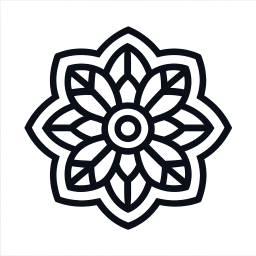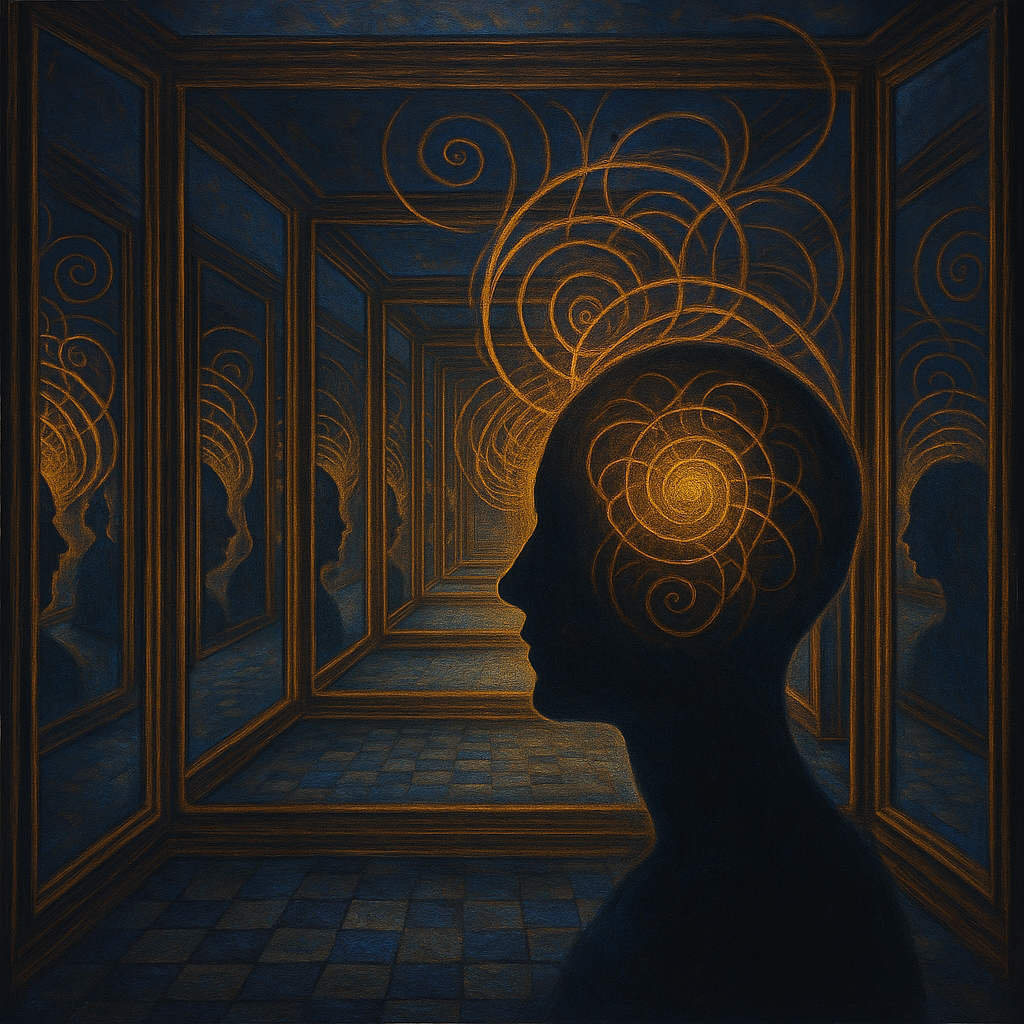Reflection. Serious thought or consideration. This too is a skill, and again, a definition I’d say does not really capture the entire thing.
Make it “Serious thought and consideration approached from all angles you are capable of.“
“We cannot see our reflection in running water. It is only in still water that we can see.” ― Zen Proverb
Reflection sharpens introspection;
introspection deepens reflection.
One clarifies the other, until you’re either lost in thought or actually found yourself.
I bet anyone is capable of serious thought or consideration.
So, how do we expand the angles we approach our problems from?
This is the crux.
Otherwise, we’re just looping the same shit, when we’re really looking for
recursion ― the loop that evolves.
Most people bounce between two or three ways of seeing a problem ―
fight, flee, or rationalize.
If you want to see your shit more clearly, you need more angles.
Here’s the toolkit:
sick modes of thinking I would recommend to hopefully better understand “What the fuck is going on in this whatever-the-fuck we are and why am I this way.”
Systems Thinking
That’s right.
Stuff together makes a functional something.
Welcome to engineering.
Reality is just a bunch of parts that (sometimes) work together ― until they don’t.
You can use this thinking to zoom in, zoom out, look sideways at literally anything.
Here’s how it works, step by step:
- An atom hangs out in a molecule with other atoms.
- A molecule is part of an organelle in a cell, with other molecules.
- An organelle lives in a cell with other organelles.
- A cell is part of a tissue, alongside more cells.
- Tissues build an organ, sometimes with other tissue types.
- An organ is one of many that make up a human.
- Humans ― along with other lifeforms ― create an ecosystem.
- Ecosystems join with others to become planetary.
- Earth (life + inorganic matter) is one planet among others orbiting the Sun, plus all those asteroids and junk.
- The solar system is part of a galactic arm. Arms make up a galaxy, which clusters with others…
…all the way out to the observable universe.
Every layer is a system inside a system inside a system ― like Russian dolls, but with more existential dread and dark matter.
Here’s an image to stimulate that thought, the flower of life:

The point?
Whenever you feel stuck, try zooming in, out, or sideways. You’ll see something new, every time.
As a child I used to love nature and binged books on nature, watched documentaries etc. Watch the Our Planet series by sir David Attenborough, it shows the interconnectedness of nature on our planet, and you’ll learn a lot about all kinds of life.
A conversation too can be viewed as a system.
Your entire life, all events in it, can be viewed as a system – interconnected happenings that at first glance are isolated, but have built on top of each other in a specific order.
So is society.
So is the economy.
So is everything we attribute to human lives ―
history, philosophy, religion, science ―
it’s all one massive, tangled system stretched across time.
Deconstructing a static image is easy, but the world’s never static ―
the system is always changing.
Which brings us to the next piece:
the system isn’t just built, it’s always becoming.
Process Thinking
That’s right.
Stuff in a system makes stuff happen.
Also, stuff is always happening.
Let’s call that “becoming.”
Welcome to the land of verbs.
It can be tough looking at yourself as a process.
You’re obviously a thing, aren’t you?
Clearly tangible, something you can touch.
But stretch yourself across time, it’ll become apparent.
You were a fetus in someone’s belly.
You were pushed out, and kept on growing, evolving.
Changing.
So, you’re clearly a thing that changes.
What’s more foundational then? You being a thing, or a process?
Consider this fucking bombshell: you are a being that’s becoming.
Becoming as being.
Both and neither.
A system made of processes.
And everything that happens to you is becoming.
And becoming forms a system: everything that ever happened to you.
Why is this useful thinking?
Consider the idea I gave in the post about practical introspection.
Writing out your entire life.
You’ll be able to identify all the processes that shaped and formed you, find all the opinions and principles that formed because of them.
You’ll be able to see that these are not static, they change.
And new happenings can change them.
Radical Non-Duality
Advaita Vedanta says self and other are illusions.
Here’s the next step: every “opposite” is just two ends of a feedback loop,
oscillating forever.
The lens you look through creates the boundaries you see.
Or, as The Dude put it: “Well, that’s just, like, your opinion, man.”
We’ll call the oscillating ends paradox from now on.
Here’s the hard truth:
your opinions, my opinions ―
even morals and ethics ―
are just stories we tell about what’s “right” and “wrong.”
The line between you and not-you?
Drawn in the sand, washed out by the tide.
The pattern cares more about the dance than who’s dancing.
There’s no right or wrong outside the scope of human thought.
That line only exists because we keep drawing it.
When you finally see things this way, you’re left with causality ―
cause and effect, and the wild potential for both.
But causality isn’t linear.
It’s a web.
Causes turn into effects, effects become causes, and every thread is tangled with a dozen others.
The more you try to pull it apart, the more you realize:
the pattern is the point. Causality is paradoxical.
Good and evil too are both the same: manipulating reality into a version of their own preference.
But once I saw this web of causality, all I could think about was the interconnectedness of everything ―
and the responsibility it brings.
Your very presence can alter the course of events.
And with that, the need for lines vanished.
When you consider your lines of action, you begin to see the ripples ―
how you influence others, how that might make them feel.
That’s what compassion is.
Not a rule, but an awakening.
You awaken to the understanding that if you were them, you’d be them,
having lived the exact same life, having had the exact same experiences,
having made the exact same decisions.
So What Do We Do With These Modes of Thinking?
We combine them, of course!
All three are incomplete alone.
Together, they form a paradoxical systemic process lens.
Try saying that five times fast.
Try it for yourself. Take something that’s eating you alive and run it through these three lenses.
Don’t just watch the ripples ― see what happens when you stir the waters.
You’ll see all life as systems of processes, where opinions are all true and reality dances between the paradox, where every lens is forcing it to be one not the other. What a joke.
So how is this useful?
At first glance, this approach seems to do the opposite of what we want:
it gives complexity while we yearn for simplicity.
Hey, I never promised simple.
“Simple” is a fairy tale we tell ourselves to dodge the work.
You want real answers? Stop wishing for easy.
It removes isolation, allows you to see the full picture:
where your suffering came from.
And it will help you redefine it.
Shift focus from the fact that you feel like shit,
and help you see what caused it.
Help yourself understand that others making you suffer have their own shit making them act the ways they do.
That they too are blindly grasping at straws in a world that makes no fucking sense until you make sense of it.
By shedding the need for simplicity, you’ll find all the answers in complexity.
You want freedom from your suffering?
Stop looking for the one simple reason.
Start tracing the whole fucked-up pattern.
That’s where the real answers live.
How do you start?
Through introspection.
Listen to the mind whispering your suffering back at you.
Look for the patterns.
Run those thoughts through this pattern of reflection I’ve given,
and talk back.
Welcome to the paradox.
Now go reflect ― until the next cycle.
Snake eats its own tail
Life followed by death stirs us
Change is the constant


Leave a Reply